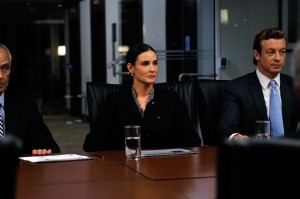‘Margin Call’ takes a look at the big bad boys of Wall Street

With the economic recession continuing its devastating march forward, writer-director J.C. Chandor has offered us a fictional glimpse into what happened the night before the excrement hit the fan. Margin Call, an exquisite feature film currently available on DVD, doesn’t mess with the minions and their botched mortgages. It doesn’t mess with Main Street and presidential politics. It doesn’t even mess with financial figures or difficult-to-understand equations.
Instead, the 107-minute drama turns a fine focus on the upper echelon of one company. Eric Dale (Stanley Tucci) begins the movie with a reality check: He’s fired from the risk department of the financial firm he’s worked at for years. On his way out the door, he passes a flash drive to Peter Sullivan (Zachary Quinto), telling him to check it out and be careful.
Peter takes a look, and so begins the unraveling. It turns out that Eric was onto something, a Nostradamus of sorts. The financial company’s projected losses far outweigh its projected gains. Failure is imminent.
With the information uneasily in his pocket, Peter rounds up the troops, played with an escalating intensity by Paul Bettany, Kevin Spacey, Simon Baker, Demi Moore and the top dog himself, Jeremy Irons. During overnight meetings and harsh assessments, the team needs to figure out a way to keep its head above the water amid the looming crisis.
It’s not hard to imagine this being the scenario right before Fannie Mae and Freddy Mac went belly up. This was the first domino, and the pieces have kept falling some three or fours later. To say that watching Margin Call is an uneasy experience is an understatement. This very well may be the best horror movie of 2011.
I love how each character views the situation in a slightly different manner. Irons, as the head of the company, is ruthless. Realizing the end is near, he wants to retain as much of his investment as possible.
Quinto can’t believe he’s privy to a collapse that will shake the core of American economics. Bettany, sucking on his cigarette, is seemingly unaffected. Spacey, a fill in for the audience, is the one with a troubled conscience. He knows the writing has been on the wall, that capitalism has grown out of control. But deep down he doesn’t know how to say no to the money.
Remarkably this is Chandor’s first film. He is able to keep all of the cast members on their A-game, and there’s not a weak one among the bunch. Spacey, in particular, grounds much of the movie in believable emotion.
Still more impressive, Chandor is able to keep us interested in what amounts to a string of taped meetings. Except for a few glimpses of home life, all of the action remains in the office. We are never allowed to leave this suffocating urban jungle.
In Chandor’s writing, there are shades of David Mamet and Glengarry Glen Ross. These are men (and Demi Moore) who have never graduated from the playground. They use our money with a reckless abandon, never worrying about the consequences for the everyman. That’s why Margin Call never shows “middle America;” these business-suit bullies have no concept of anyone outside their social strata.
By John Soltes / Publisher / John@HollywoodSoapbox.com
-
Margin Call
-
2011
-
Written and directed by J.C. Chandor
-
Starring Kevin Spacey, Zachary Quinto, Jeremy Irons, Simon Baker, Stanley Tucci, Paul Bettany and Demi Moore
-
Running time: 107 minutes
-
Rated R for language
-
Rating:





